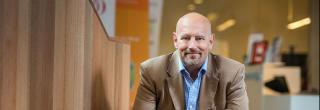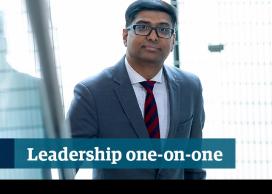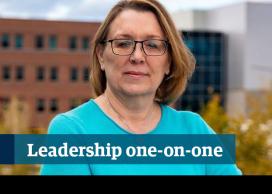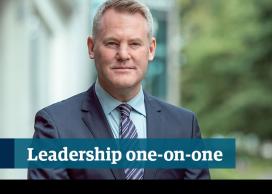Raised in the Okanagan, Dr. Philip Barker joined UBC in 2015 to serve a dual role focused on research and innovation. As Associate Vice-President Research, Dr. Barker has responsibility for innovation across the UBC system, while as Vice-Principal Research, he is responsible for providing leadership and direction on all research matters on the Okanagan campus.
Dr. Barker is a molecular biologist and biochemist by trade, and his research lab has published more than 100 scientific papers on signals that regulate life and death decisions in neurons and cancer cells. He co-founded a biotechnology company, holds several patents, and has developed and licensed a number of technologies.
Q1. What quality do you most admire in a leader?
PB: To me, what’s important is being able to translate vision into reality. I think this takes tremendous people skills. In my experience, it’s about giving people an opportunity to buy into a vision and feel like they own it.
Q2. What makes you laugh?
PB: Pretty much everything! I consider myself someone who has a pretty good sense of humour. I love comedy, especially silly satires that poke fun at the conventional. Shows like Fawlty Towers are a favourite.
Q3. Who inspires you, and why?
PB: If I were to pick a personal hero, it would be Terry Fox. He is someone who took on a huge and unique challenge that was truly inspiring. His efforts really connected with me personally, probably in part because I attended Simon Fraser University at the same time as him. From an entirely different sphere, Alan Mulally — an engineer and former President and CEO of Ford Motor Company — is also someone I admire. He was able to create a strong vision and a workplace culture where people were inspired and empowered to do their best work.
Q4. What’s your biggest accomplishment so far at UBC?
PB: It’s still early days, but I’m especially happy about how I’ve had the chance to work with teams on both campuses to make sure we’re aligned in our goals. I recently helped lead a strategic planning exercise around innovation for both campuses, and I’ve just completed a draft research support plan for the Okanagan campus that is now being circulated for feedback. I’m excited about implementing these plans and working with teams in Vancouver and the Okanagan to accomplish the goals we’ve set. A big part of my job so far has been understanding the culture at UBC, and getting to know people on both of our fantastic campuses.
Q5. What is the most important lesson you’ve learned?
PB: I’ve learned that it’s important to first ensure our teams are aligned in our mission and strategic goals, and then to give people the responsibility and freedom to accomplish those goals. In my experience, this is the most satisfying way to get things done while also allowing people to develop their skills. This approach can take time, but I’ve learned the importance of patience when it comes to setting goals and then getting things done.
Q6. What is the best advice you were ever given?
PB: My PhD supervisor taught me the importance of making it easy for people to say ‘yes’. If you are making an ‘ask’, come prepared to present a compelling, data-supported case with a clear path forward and defined outcomes.
Q7. What do you think UBC’s impact has been in the Okanagan?
PB: It’s really extraordinary. Growing up in the Okanagan, leaving to go to university, and then coming back to work here has offered me an interesting perspective, and I can say that the Okanagan has changed dramatically as a result of UBC’s presence.
The university is playing a key role in the economic development of this region. Not only as a major employer, but also in producing talent that’s choosing to stay here and contribute to society and the local economy. We now have an exciting technology sector in the Okanagan, and we’re partnering with a broad array of companies and non-profits in the region.
There are many opportunities here for those who stay, and they can enjoy a great lifestyle in one of the most beautiful areas of the country.
Q8. What do you value in your colleagues?
PB: I have a fantastic team — smart, devoted, and hard-working. We all recognize that we’re bringing different things to the table, but we all have a shared vision around what UBC is, and can be going forward.
Q9. What is the song you sang out loud as a teenager?
PB: There are many! I like music a lot. When I think back to when I was graduating high school and spending time at the beach in Kelowna, songs that come to mind include Miss You by The Rolling Stones and Space Oddity by David Bowie.
Q10. How do you like to recharge?
PB: For me, it’s spending time outdoors and being active with my family. We swim, bike, hike, and ski together — we get up to Big White for skiing quite frequently.
Another way I recharge is through reading. I am a fairly voracious reader, and it’s often what I’m doing in those quiet moments. Mordecai Richler is one of my all-time favourite authors, and I’m reading a series now called Berlin Noir by Philip Kerr, which I’m finding fascinating.
Q11. What advice would you give a young student just starting out?
PB: I would advise students to become really good at something and see where it takes you. Build up a stockpile of confidence in a certain area, and it will serve you well and allow you to spread your wings. I think it’s about playing to your strengths.
Q12. What makes UBC a global research leader?
PB: We have many advantages at UBC that differentiate us from other universities and make us a leader. We are able to draw amazing people to the university, and they can see themselves having a life-long career path here. They also care deeply about the institution, which is a real strength for UBC. When we couple our ability to recruit and retain the best with our incredible infrastructure, we really have a winning combination.
Q13. What would you like to be remembered for?
PB: Everything I do is really a team sport. As a Kelowna boy, what I would like to see happen, and be able to play a role in, is to have the Okanagan campus increasingly seen as a hotbed of research intensity and quality. I’d also like to see UBC viewed as the most innovative and entrepreneurial university in North America, if not the world. We’re already on our way to achieving these goals, and I’ll be happy if I can help us continue along this path.
Published:
Interviewed by: UBC Internal Communications



